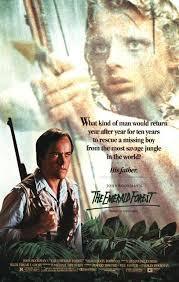Howard Andrew Jones's Blog, page 71
July 2, 2013
The Emerald Forest
The Jones family summer movie viewing continues. My wife and I have been introducing our children, both teenagers, to features we remembered enjoying when we were about their same age.
Some of the movies I enjoyed in the ’80s don’t stand up well. Alright, a lot of them don’t. I remember thinking that Sixteen Candles was hilarious, and when I sat down with the wife and kids to re-watch it there were plenty of moments of humor… until I was suddenly aware how unconscious I’d been about all the sexism. That the love interest, Jake Ryan, passes over his girlfriend to the geeky character played by Anthony Michael Hall to do whatever he likes with is awful. I vaguely recall being uncomfortable with the moment before, but not so much so that I’d remembered it in detail. Now it struck me as incredibly icky. THIS same guy is the one we’re supposed to be pleased Samantha ends up with? I could no longer shrug the moment off and say, “oh, it’s just a comedy, Howard. It’s supposed to be light.” How could any father, brother, or son have written those scenes? Blech.
The Emerald Forest is a very different animal from Sixteen Candles. But it was an ’80s flick, and I’m a lot older, and I wondered if the messages about deforestation I thought subtle would now be like hammers on a gong.
Nope. The Emerald Forest was still pretty darned good. It could have been simplistic with its depiction of civilization as evil and the men of nature being good, but there are good and evil players amongst those from outside the forest and those within. It’s more a story of human nature than it is an anti-progress polemic.
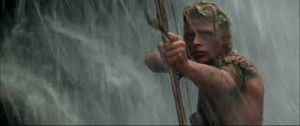 One of the things I most enjoyed was the way things played out without a whole lot of dialogue explaining internal states. You had to infer some of what was going on. There were no moments of a character suddenly explaining to a friend — for the audience’s sake — what they were feeling inside, and how they had learned and grown. If you were paying attention, it all made sense. The movie assumed you were clever enough to follow along. There were times when a scene ended just when some other movie might have focused in on a juicy discussion about what someone had felt or learned. Well, since we could guess what they were going through, for pacing’s sake the scene ended. And sometimes it was almost as though the scene ended so that the characters could have a moment of privacy to discuss what had transpired, something that we could imagine and did not need to hear.
One of the things I most enjoyed was the way things played out without a whole lot of dialogue explaining internal states. You had to infer some of what was going on. There were no moments of a character suddenly explaining to a friend — for the audience’s sake — what they were feeling inside, and how they had learned and grown. If you were paying attention, it all made sense. The movie assumed you were clever enough to follow along. There were times when a scene ended just when some other movie might have focused in on a juicy discussion about what someone had felt or learned. Well, since we could guess what they were going through, for pacing’s sake the scene ended. And sometimes it was almost as though the scene ended so that the characters could have a moment of privacy to discuss what had transpired, something that we could imagine and did not need to hear.
My son commented that the movie had a different kind of pacing than more recent movies but that it had still commanded his attention. Both he and my daughter quite enjoyed it. And my wife and I did as well. I have to say that while all the actors did a commanding job, young Charley Boorman absolutely makes the movie. He’s utterly believable in a role that would have been far simpler to render ridiculous.
Now, since I’m a writer and not a movie reviewer, and I assume the reason a lot of you are here is to see what I’m working on, I’ll report that I’m currently drafting a short story for Paizo that’s related to my upcoming Pathfinder Tales novel. Once I finish, I’m probably back to work on my new secret project, which is currently taking precedence over a third Dabir and Asim novel.
June 29, 2013
Still Reading Vance
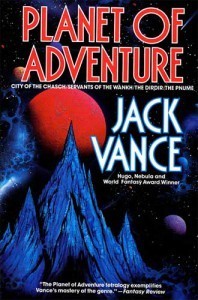 In the past I’ve usually read Jack Vance in short spurts, but this time I’ve been on a huge binge and am still enjoying the prose. The whole exploration (and re-discovery in the case of Planet of Adventure) was unfortunately sparked by the author’s death.
In the past I’ve usually read Jack Vance in short spurts, but this time I’ve been on a huge binge and am still enjoying the prose. The whole exploration (and re-discovery in the case of Planet of Adventure) was unfortunately sparked by the author’s death.
I’ve just closed the last page on The Planet of Adventure omnibus and I found it just as difficult to set down as I had the first time, which really says something. It has all the usual Vancian touches: fascinating cultures, religions, and philosophies, not to mention truly alien aliens. Protagonist Adam Reith isn’t that different from Vance’s other non-satirical protagonists (like Kirth Gersen, say) but his straightforward outlook and intelligence remain refreshing, not to mention his sense of decency, his bravery, and his loyalty to friends. And speaking of friends, one of the things I like about this sequence is that there is a cast of loyal companions. Vance’s protagonists are usually lone wanderers. There’s plenty of wandering on the planet Tschai, but Reith is usually with at least one of his friends.
Interestingly, I can’t believe I never noticed this before, but it is becoming more and more clear to me that Vance had a huge impact on the first big science fiction game, Traveller. Reith is a planetary Scout, and is a jack-of-all-trades and survival expert, just like the characters in Traveller‘s Imperial Scout service. There are Traveller’s aid hostels in the Alastor books, not to mention air rafts and, perhaps more importantly there’s the general feel of independent planets in a sector but a unified sector government. In Vance, as with Traveller, every planet is a potential adventure setting. Vance, then, was a huge influence not just on D&D (the fire and forget spells, the hand and eye of Vecna) but upon Traveller‘s default setting.
These books, being written for the most part back in the late ’60s and early ’70s, are still pretty male-centric. It’s not that women in the stories aren’t intelligent, but they’re almost never the focus of the story and don’t usually have much interaction with the main character unless there’s a love interest. I suppose that’s due to the reader base at the time, which would have been primarily male, not to mention the American culture of the period. It’s really the only dated aspect to be found, for Vance was otherwise quite farseeing. I hope this won’t damn him for future readers. It is too much to expect even a genius to completely transcend the time in which he was writing. (Assuming people will still be reading anything of mine in 40 years, I wonder what things I’ll have done that will make my work dated? Hope I’m still alive to hear about it…)
Speaking of great fiction, my son’s now back to reading the first Chronicles of Amber (Zelazny, not Vance) and is up to book 3, Sign of the Unicorn. He loves it, and it’s a real pleasure to see him astonished by the various surprises and plot turns. I think I was about his age when I read the books for the first time, and I don’t think there is any other work I’ve read as many times, even including the stories of Harold Lamb.
June 27, 2013
Kai Lung
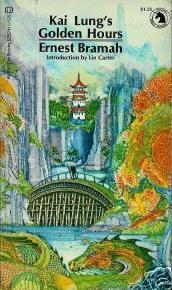 Last week, both here and on Facebook, I mentioned my love for the works of Jack Vance and my new found appreciation of the Cugel stories, which had left me wanting 8 or 10 years previous.
Last week, both here and on Facebook, I mentioned my love for the works of Jack Vance and my new found appreciation of the Cugel stories, which had left me wanting 8 or 10 years previous.
Now I’m wishing that I hadn’t sold off my Ernest Bramah Kai Lung books. Earlier I had found the tone forced and a little twee — now I’m thinking my tastes have broadened a bit and that I might have missed out on something grand… and rather Cugel-like in some ways. Anyone out there have an opinion on the Kai Lung stories they want to share? I see that the first two collections are available from Project Gutenberg if anyone is truly curious, and I suppose I will turn there myself eventually.
John O’Neill will probably faint in horror, but I’ve actually been downsizing my book collection and getting rid of things I don’t think I’ll re-read (as I get older, the things I’m unlikely to re-read gets longer) and things I’m no longer interested in. Occasionally I regret my choices. It wouldn’t have taken up too much room to hold onto my two Kai Lung books from the old Ballantine Adult Fantasy line. I just thought that they weren’t to my taste. Now, as I’ve discovered that my tastes are widening, I think I’ll be a little more judicious about unloading books going forward.
If Ernest Bramah and Kai Lung aren’t familiar to you, there’s a wonderful essay about the books over at a site titled Greatsfandf.com. Here’s the link.
June 25, 2013
A Prayer for Heroes
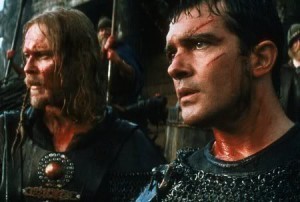 I sat down the other evening with my wife and son for my second viewing of The 13th Warrior. I hadn’t seen it for a long while, and I discovered I enjoyed it just as much or more than I had the first time.
I sat down the other evening with my wife and son for my second viewing of The 13th Warrior. I hadn’t seen it for a long while, and I discovered I enjoyed it just as much or more than I had the first time.
I was surprised to learn that it had only a 33% fresh rating at Rotten Tomatoes and that it hadn’t done at all well in the cinema. It’s a very fine story of heroic adventure with comrades-in-arms, with some honest-to-goodness chills, thrills, and mystery. At least that’s my opinion. It’s one of the better heroic movies filmed in the last quarter century. God knows I’d rather watch it a few more times than, say, Conan the Destroyer. Apparently I’m out of step with the consensus. I flipped through the various negative reviews and shook my head at the comments and lack of appreciation. As an adventure story it does so many things right that many movies do wrong… but that’s not what makes it great. For all the in-your-face violence, much of what happens is understated, including character development and the themes of heroism.
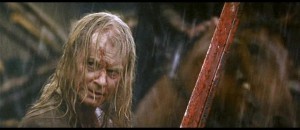 My wife likes the movie but even she thought that the final moments of Buliwyf’s life strain credulity. I responded that his final moments must strain credulity or they would not have come down to us even in distorted form, and that real men and women have done amazing things — I’ve written about Audie Murphy on this very blog. His own feats were so amazing that Hollywood actually had to tone some of them down for his biopic.
My wife likes the movie but even she thought that the final moments of Buliwyf’s life strain credulity. I responded that his final moments must strain credulity or they would not have come down to us even in distorted form, and that real men and women have done amazing things — I’ve written about Audie Murphy on this very blog. His own feats were so amazing that Hollywood actually had to tone some of them down for his biopic.
The Viking prayer from the movie (apparently invented for the movie, for the version from the book — Michael Crichton’s Eaters of the Dead, doesn’t sound nearly as good), encapsulates the Norse approach to life and heroism so nicely that I took the trouble to put it to memory the last time I saw the film. It speaks of the awareness of an individual’s place in society and the necessity for bravery in a land where death comes to all. In other words, a prayer that might suit all brave men and women. It is introduced near the start of the film, when the character through whom we experience the movie, Ahmed, still sees the Viking culture as foreign and barbaric. By the end of the movie he has become a brother to the other heroes, and as a result the moment when he joins in the prayer before the final battle against overwhelming odds is perhaps the most stirring in the movie.
Here it is:
Lo, there do I see my father.
Lo, there do I see my mother and my sisters and my brothers.
Lo, there do I see the line of my people, back to the beginning.
They do call to me; they bid me take my place among them in Valhalla, where the brave may live forever.
That’s great stuff. I’m working on an oath some of my characters swear in one of my new book projects, and I keep this in mind as I hone it. I still don’t have anything half as good.
June 21, 2013
Doing That Thing
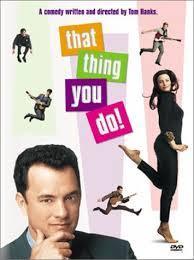 Mostly that thing I’ve been doing is getting the house ready for two birthdays. Owing to my son’s immense high school homework load there was no real birthday gathering, so we’re readying for one shortly after my daughter’s, and both are taking place this weekend. Add that to the deadline run at the most recent Pathfinder book I finished and the mini-trip in the middle of the week, and I haven’t been able to get much done on other writing projects. That will change come Monday.
Mostly that thing I’ve been doing is getting the house ready for two birthdays. Owing to my son’s immense high school homework load there was no real birthday gathering, so we’re readying for one shortly after my daughter’s, and both are taking place this weekend. Add that to the deadline run at the most recent Pathfinder book I finished and the mini-trip in the middle of the week, and I haven’t been able to get much done on other writing projects. That will change come Monday.
I did sit down and watch That Thing You Do with the family, and I liked it even more than I had the first time. What a fine little movie. And for all of us would-be 1960s rock stars, it provides just a little taste of what it might have been like to be a one-hit wonder.
I finished up Cugel’s Saga and then went straight into Rhialto the Marvelous, the fourth and final Dying Earth book. They were in an omnibus that’s been sitting on my shelf for 5 or 6 years, beside the two volumes of Jack Vance’s The Demon Princes. I’m now picking up the second volume of those, which I likewise set aside some years back after finishing volume 1. Who knew how excellent these treasures would be when I finally cracked them open? I suspected, but I didn’t know. I imagine I have some other treasures waiting to be opened on the shelves as well…
June 19, 2013
Tales of the Dying Earth
I’m away from home on a borrowed laptop, so I’ll keep this short. I just wanted to drop in and say how much I enjoyed the wrap-up of Jack Vance’s Cugel’s Saga, a novel contained in the orb omnibus Tales of the Dying Earth. I just finished it about a half hour ago on this mini-vacation, after slowly savoring it during the last month, and it was pretty marvelous… although keeping in line with previous comments I’ve made on my blog, I’m not sure younger Howard would have appreciated it as much.
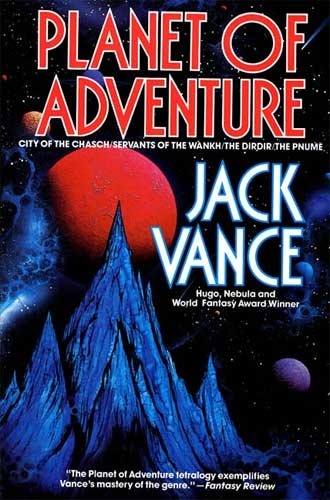 I’m not sure if I’m ready for more Vance right away or not, but I enjoyed it so much I think I’ll stockpile some more for later reading. I see that there’s an Alastor omnibus, which I should probably explore before I re-read his Planet of Adventure series. I love Vance’s writing, though I usually tackle it in limited doses. I have a few standalones lying around the house, as well as some other series I’ve read or partially read.
I’m not sure if I’m ready for more Vance right away or not, but I enjoyed it so much I think I’ll stockpile some more for later reading. I see that there’s an Alastor omnibus, which I should probably explore before I re-read his Planet of Adventure series. I love Vance’s writing, though I usually tackle it in limited doses. I have a few standalones lying around the house, as well as some other series I’ve read or partially read.
Are any of my regular visitors Jack Vance fans? What are some not-miss titles? How do the Durdane books stack up?
June 17, 2013
The Beast is Off
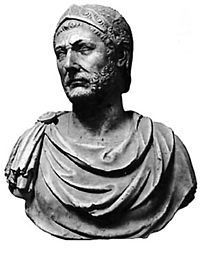 To the races? Nay, Stalking the Beast is lumbering back to editor James Sutter at Paizo. Whew. I’m starting to feel pleased, although I’m also a bit dazed after the final push. Today, apart from a laborious spell check (a lot of words from Pathfinder aren’t recognized by the spell checker) I was mostly tweaking some really subtle things that will probably never get noticed. Getting them fixed made me feel better, at least.
To the races? Nay, Stalking the Beast is lumbering back to editor James Sutter at Paizo. Whew. I’m starting to feel pleased, although I’m also a bit dazed after the final push. Today, apart from a laborious spell check (a lot of words from Pathfinder aren’t recognized by the spell checker) I was mostly tweaking some really subtle things that will probably never get noticed. Getting them fixed made me feel better, at least.
I finally managed to win a crayon rail game, the first in probably the last ten I played against my brilliant wife, and the second time I played Martian Rails. Also, I pulled the one Leigh Brackett title card in the game near the last hand, as if the gods of Mars and random chance were operating in my favor. Nice. Father’s Day was pleasant, and included a slightly moist walk in some woods near our old house and a tasty lunch with fried oysters. Well, with the family, actually, but I ate fried oysters.
I’ve been slowly working my way through the second Cugel the Clever novel in the Dying Earth omnibus, and I’m enjoying it even more than the first. It’s an odd thing, but as I age, my tastes are sort of broadening at the same time I get more particular. I have even less patience for sloppy storytelling and plotholes than I did before (and I never had much), but I find that I have more patience for different kinds of writing than I used to enjoy. Vance stories can frequently be more picaresque than I typically like, but I’m fully on board with this. And in March I read and loved Tanith Lee’s Night’s Master, from her famed Flat Earth cycle. I’ve often found her prose beautiful but distant, with scenes rather than plots, but this book I loved.
June 15, 2013
A Rise in Spam
I’m getting a rising number of spam comments — perhaps its because the site’s getting more hits. I’m a little baffled by them. They consist of two types.
1. Someone drops a comment in a thread about a product completely unrelated to the topic.
2. Someone drops a generic few phrases of praise in slightly incorrect English about how much they enjoyed the post, and the masterful way the topic is discussed.
I can’t quite figure out what spammers expect to get from the comments. NO ONE will ever buy a topic or visit a page based on someone dropping in to a comment thread to advertise their product. And why pretend to be involved in a thread? Is it so that we’ll visit the site usually attached to the comment, or so that the blog master or mistress will come to trust posts from that person, opening the door for more spam?
Strange and annoying.
June 13, 2013
Stalking the Martian Beast Rails

Click to enlarge. Barrakesh is near the bottom right side of the image.
As I wind down my edits on the second Paizo Pathfinder novel I’m looking forward to playing a new board game that arrived Tuesday. Regular visitors may recall I was selling off most of my board wargames after discovering Fields of Glory. I’ve put a little of the trade-in money towards purchases of inexpensive Fields of Glory expansions, and am stockpiling the rest for a new laptop… but I also picked up a copy of Martian Rails.
It might be that the family is becoming addicted to crayon rail games. All I know is that we’ve enjoyed Iron Dragon for years, and Martian Rails, set on a mostly retro-future Mars, looked like it would be the same kind of fun. The designer behind it (M. Robert Stribula) really did his Martian research and pretty much made my day when one of the first cities I spotted on the map was Barrakesh, from the wonderful Martian stories of Leigh Brackett. One of the event cards references the lost city of Sinharat, likewise from Brackett.
The rest of the map is sprinkled with references from other science fiction, fact, and popular imagination. There are canals, naturally, and cities named after astronomers famed for sighting them. There are multiple references to Bradbury and Burroughs (including types of trains named after John Carter and Dejah Thoris), pyramid mines needing Turbinium (from Total Recall), and a city named Isher (famed for its rayguns — a tip of the hat if you get that reference). Martian cities require shipments of all kinds of goods, among them Roddenberries, Bachelor Chow, and Soylent Red.
The map manages to work in features from hard science fiction and the space opera imaginings of what we all really want Mars to be like, so there are a few jungles lying along the canals that stretch across the globe.
Anyway, I look forward to the weekend so I can match wits with the family and maybe a friend or two… although I’m pretty sure my wife will win. She’s frighteningly good at these sorts of organizational games.
If you’re interested in learning more, you can read reviews of the game on Boardgame Geek, including a video review that shows some of the contents. A little Internet shopping at game stores will get you to more inexpensive copies than you’ll spot at your usual first stops.
June 12, 2013
Writing of Ruins

Click to see a larger version.
This week I should be finished with my editorial changes on my second Paizo Pathfinder novel, Stalking the Beast, which I’ve been working on steadily. Ideally I’ll have time to reach the final page then set it aside for a day or two so I can see the whole thing with fresh eyes right before I turn it over. I find that I miss things unless I can walk away from the work for a little while.
As I discussed the cover some months back with series editor James Sutter I chose a scene I thought would be dynamic. And I recall suggesting that perhaps there should be some ruins in the background. In the draft at that time, there were no ruins, but I never like taking my characters (or my readers) somewhere unless it’s interesting to look at, so it was something I intended to go back and correct. When the art came back, there were some pretty interesting ruins in the scene, so during the rewrite I’ve found myself modelling my descriptions on the artist’s depiction. Which reminds me, I still don’t know the cover artists’ name! I’ll have to write James and find out, because I’d like to thank him or her for the inspirational work.
Howard Andrew Jones's Blog
- Howard Andrew Jones's profile
- 368 followers


